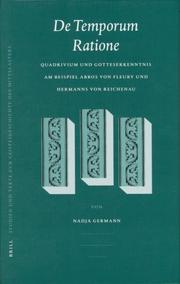| Listing 1 - 5 of 5 |
Sort by
|
Multi
ISSN: 05219884 ISBN: 9783170307230 3170307231 Volume: 208 Publisher: Stuttgart Kohlhammer
Abstract | Keywords | Export | Availability | Bookmark
 Loading...
Loading...Choose an application
- Reference Manager
- EndNote
- RefWorks (Direct export to RefWorks)
Hermann der Lahme (1013 -1054) zahlt zu den grossen klosterlichen Gelehrten des Mittelalters. Trotz seiner korperlichen Behinderung schuf Hermann zahlreiche Werke auf dem Gebiet der Geschichtsschreibung, der geistlichen Dichtung, der Musik, Arithmetik, Astronomie und Komputistik. 15 Studien ausgewiesener Fachleute zeichnen erstmals ein umfassendes Bild von Hermanns intellektueller Breite und Schopferkraft.
Book
Year: 2014 Publisher: Dendermonde: Sint-Pieters- en Paulusabdij,
Abstract | Keywords | Export | Availability | Bookmark
 Loading...
Loading...Choose an application
- Reference Manager
- EndNote
- RefWorks (Direct export to RefWorks)
Book
ISBN: 3930978679 9783930978670 Year: 2004 Volume: 11 Publisher: Heidelberg: Mattes,
Abstract | Keywords | Export | Availability | Bookmark
 Loading...
Loading...Choose an application
- Reference Manager
- EndNote
- RefWorks (Direct export to RefWorks)
Authors, German --- Composers --- Ecrivains allemands --- Compositeurs --- Hermannus, --- Benedictines --- Scholars --- Music theorists --- Scholars - Germany - Biography. --- Music theorists - Germany - Biography. --- Hermannus Contractus mon. Augiensis
Book
ISBN: 9781580463904 1580463908 9781782046462 1782046461 Year: 2015 Publisher: Rochester, NY : University of Rochester Press,
Abstract | Keywords | Export | Availability | Bookmark
 Loading...
Loading...Choose an application
- Reference Manager
- EndNote
- RefWorks (Direct export to RefWorks)
Long recognized as one of the most important medieval treatises on music, the Musica of Hermannus Contractus is here presented in a newly revised translation, with commentary reflecting the best current scholarship. A polymath and monk, Hermannus Contractus (1013-54) contributed to the important advancements made in European arts and sciences in the first half of the eleventh century, writing on history, astronomy, and time-keeping devices, among other topics, and composing several chants. His music theory, founded on a systematic treatment of traditional concepts and terminology dating back to the ancient Greeks, is concerned largely with the organization of pitch in Gregorian chant. Hermann's approach stems from Germanic species-based thought, and is marked by a distinction between aspects of form and aspects of position, privileging the latter. He expresses this in terms imported from then-new developments in Italian music theory, thus acting as a nexus for the two traditions. Numerology and number symbolism play significant roles in Hermann's theories, and his critiques of other theorists offer insights into medieval intellectual life. Hermann also uses chant citations and exercises to help his readers apply theory to practice. John L. Snyder's revised edition of Ellinwood's long-standard 1952 text and translation offers a new introduction, including codicological descriptions of the sources; a critical edition of the Latin text with an annotated English translation on facing pages; appendices detailing the documents pertaining to Hermann's life, his citations of plainsong, and his original diastematic notation system; and greatly expanded indexes. Snyder's Musica will serve as the standard version of this major historical document for years to come. Leonard Ellinwood (1905-94) served in the Library of Congress cataloging divisions in music and in the humanities for thirty-five years. He published scholarly works and editions of both medieval music and church music. John L. Snyder is Professor of Music Theory and Musicology at the University of Houston's Moores School of Music.
Music theory --- Théorie musicale --- Early works to 1800. --- History --- Ouvrages avant 1800 --- Histoire --- Hermannus, --- Music --- Theory --- Contractus, Hermannus, --- Herman, --- Hermann, --- European arts. --- Germanic species-based thought. --- Gregorian chant. --- Hermannus Contractus. --- Italian music theory. --- Musica. --- diastematic notation system. --- medieval intellectual life. --- medieval treatise. --- music theory. --- number symbolism. --- numerology.

ISSN: 01698028 ISBN: 9004153950 9789004153950 9786611400637 1281400637 9047411013 Year: 2006 Volume: 89 Publisher: Leiden: Brill,
Abstract | Keywords | Export | Availability | Bookmark
 Loading...
Loading...Choose an application
- Reference Manager
- EndNote
- RefWorks (Direct export to RefWorks)
This study examines the scientific interests and rationality which find expression in the quadrivial sources of the 9th to 11th centuries, arguing on this basis for the existence of a 'discovery of nature' already prior to the 12th century. It focuses on the theme of 'time', exemplified by Abbo of Fleury's Computus, as well as Hermann of Reichenau's Epistola de quantitate mensis lunaris, Abbreviatio compoti and Prognostica. The systematic and historical background of the study is established through analysis of Alcuin's De vera philosophia, Bede's De temporum ratione and the computistic-astronomical anthologies which were the predominant genre during this period. The volume is complemented by fourteen illustrations and an appendix including Hermann's heretofore unedited texts, the Abbreviatio compoti and Prognostica.
Calendar --- Education, Medieval. --- God --- Calendrier --- Education médiévale --- Dieu --- History --- Knowableness --- History of doctrines --- Histoire --- Cognoscibilité --- Histoire des doctrines --- Abbo, --- Hermannus, --- God (Christianity) --- Knowableness. --- Criticism and interpretation. --- 2 ABBO FLORIACENSIS --- 115 --- Knowableness of God --- Knowledge of God (Knowableness of God) --- Education --- Medieval education --- Seven liberal arts --- Civilization, Medieval --- Learning and scholarship --- Computus --- Astronomy --- Chronology, Historical --- Chronology --- Godsdienst. Theologie--ABBO FLORIACENSIS --- Tijd. Duur. Eeuwigheid --- Knowledge (Knowableness) --- Contractus, Hermannus, --- Herman, --- Hermann, --- Abbon, --- 115 Tijd. Duur. Eeuwigheid --- 2 ABBO FLORIACENSIS Godsdienst. Theologie--ABBO FLORIACENSIS --- Education médiévale --- Cognoscibilité --- Education, Medieval --- Calendar - Europe - History - To 1500. --- God (Christianity) - Knowableness. --- Abbo, - of Fleury, Saint, - ca. 945-1004 - Criticism and interpretation. --- Hermannus, - Contractus, - 1013-1054 - Criticism and interpretation. --- Abbo, - of Fleury, Saint, - ca. 945-1004 --- Hermannus, - Contractus, - 1013-1054
| Listing 1 - 5 of 5 |
Sort by
|

 Search
Search Feedback
Feedback About UniCat
About UniCat  Help
Help News
News